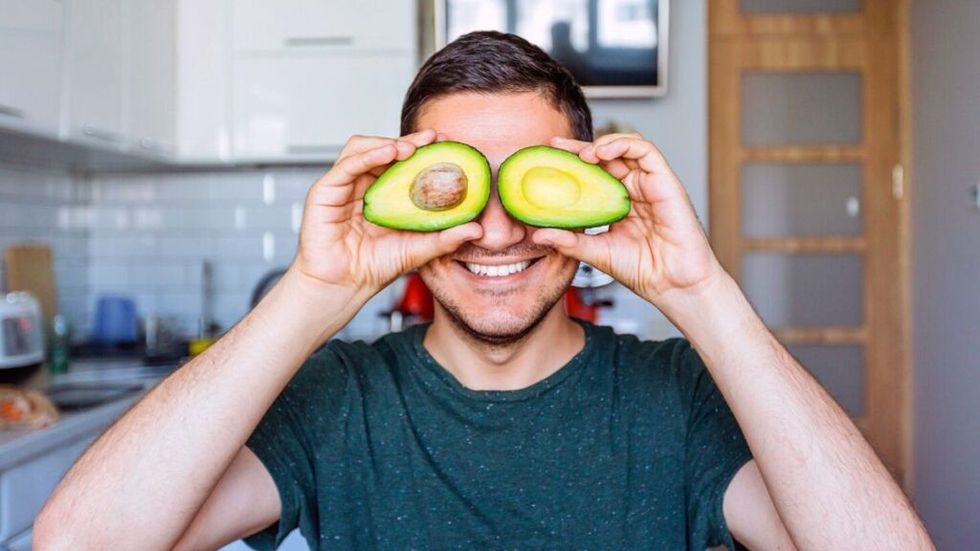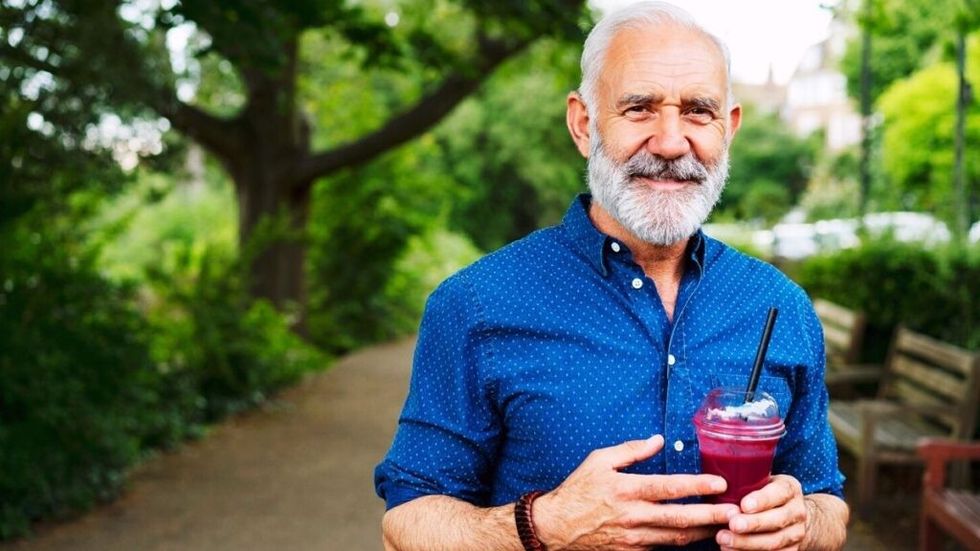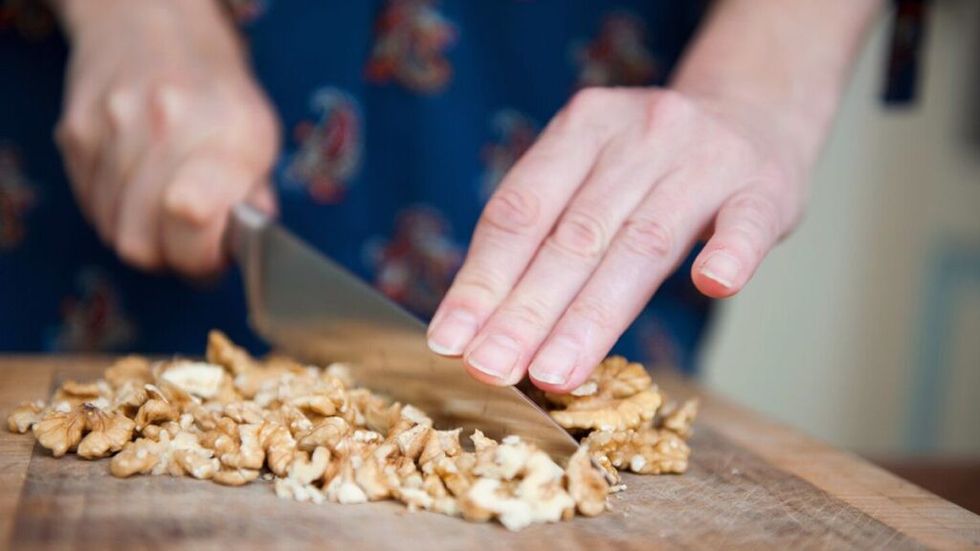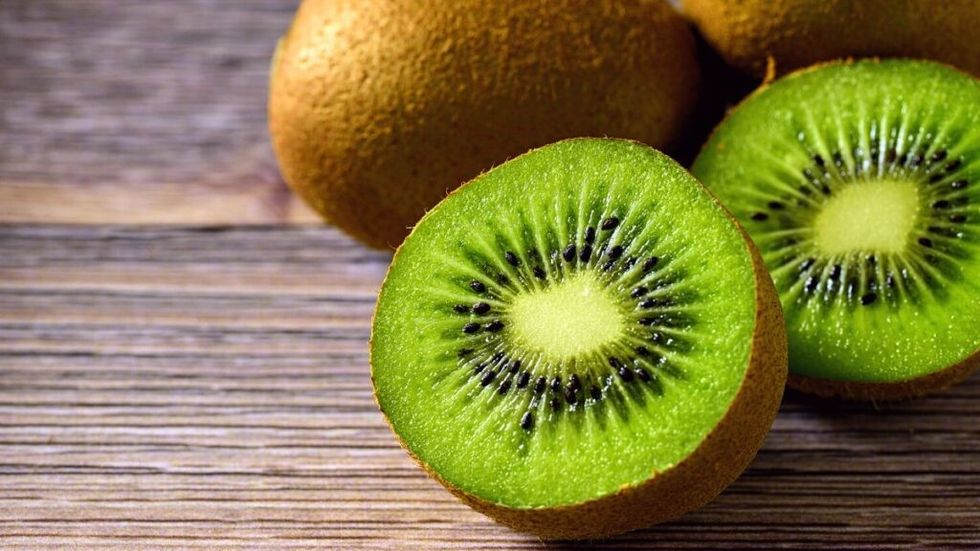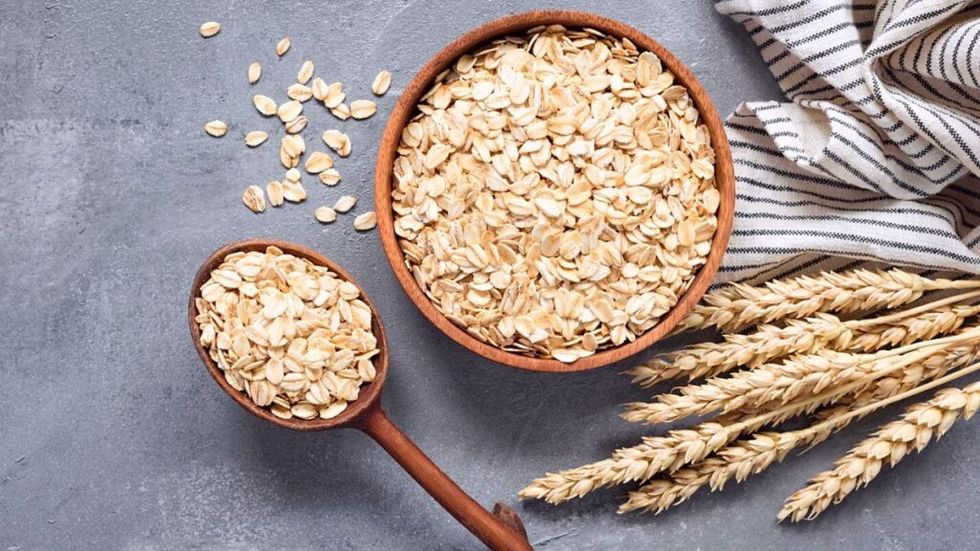People often say that finding purpose is the foundation of a healthy and more fulfilling life. Yet for millions of people, purpose feels elusive, like some far-off destination, an epiphany waiting for divine intervention.
Narratives around living the life of your dreams can package purpose in a very set way, telling stories of a select few who were lucky enough to find their purpose, and never looked back.
All of these assumptions about purpose make it both intimidating and seemingly unattainable. Factor in cultural ideas of what purpose looks like — from starting a billion-dollar venture in Silicon Valley to living a life in service of the greater good — and you’ll likely be left feeling frustrated, or confused, about how to add purpose to your life.
Fortunately, these assumptions are misleading. Purpose is much easier to attain than it seems on the surface. And, thankfully, the Japanese concept of ikigai makes discovering your purpose practical. There’s no need to wait for a eureka moment, or yearn for the day purpose will arrive on your doorstep. With ikigai as your own personal Japanese secret, you can start taking deliberate steps to add purpose to your days and inhabit a more happy life. This article will show you how you can start your own personal ikigai journey. Let’s get started!
What is the Japanese concept of Ikigai?
The best translation for ikigai (pronounced “ee key guy”) is “a reason for being.” The term is formed from the Japanese words iki (life) and gai (worth or benefit).
Ikigai is central to Japanese culture, with its origin stretching all the way back to the Heian period, a period of classical Japanese history lasting between the years 794 and 1185.
American researcher Dan Buettner, who presented the popular Ted Talk How to Live to 100, identified ikigai as one of the main factors for greater longevity in Japan. Buettner popularized the concept in the West in the early 2000s.
Long before then, Japanese psychiatrist Mieko Kamiya, the Mother of Ikigai, wrote one of the most popular modern-day books on the philosophy, Ikigai-ni-Tsuite (What Makes Our Life Worth Living), in 1966. This was around the time early positive psychology was born. Psychologists such as Abraham Maslow, Carl Rogers, and Viktor Frankl shifted the paradigm of psychology away from pathology, and towards what makes for a fulfilling, meaningful life.
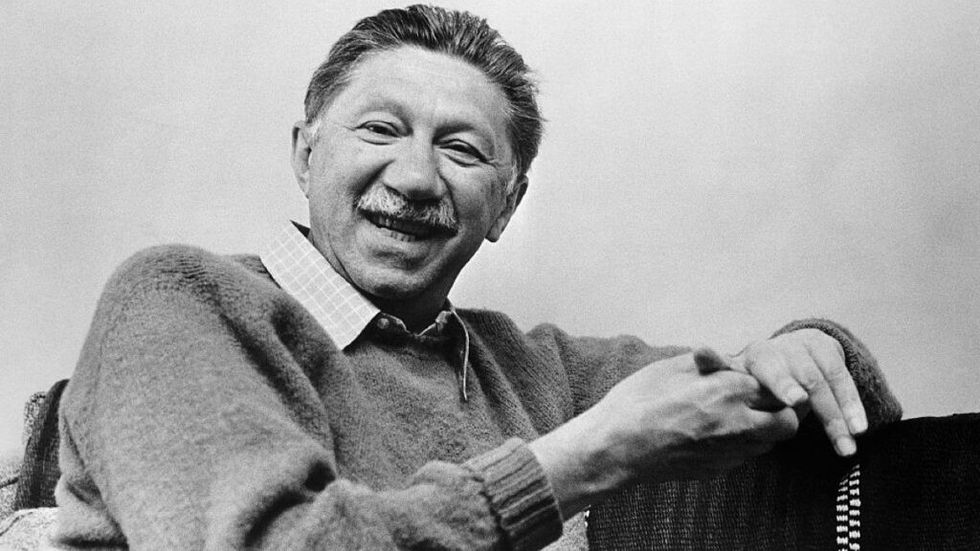
Moving towards a more meaningful life
Kamiya herself compared ikigai to Frankl’s approach to meaning. Both were well-versed in how suffering could lead to personal growth. Frankl from his time spent in concentration camps during the Holocaust, and Kamiya worked with leprosy patients. Kamiya described ikigai as:
“Ikigai means ‘power necessary for one to live in this world, happiness to be alive, benefit, effectiveness.’ When we try to translate it into English, German, French etc, it seems that there is no other way to define it other than ‘worth living’ or ‘value or meaning to live’. Thus, compared to philosophical theoretical concepts, the word ikigai shows us how ambiguous the Japanese language is, but because of this it has an effect of reverberation and amplitude.”
She acknowledged that “the fact that this word exists should indicate that the goal to live, its meaning and value within the daily life of the Japanese soul has been problematized.” In other words, the word exists because modern-living, to some degree, has disconnected people from their innate sense of purpose, or their soul’s calling.
Kamiya further defines ikigai into two categories — the source of ikigai, and the state of mind someone feels when connected to the source (ikigai-kan). For Kamiya, ikigai-kan is linked to Frankl’s concept of meaning. In life, a person’s mission is to connect to their mission. Failure to do so can result in depression or anxiety.
In order to become clear on this mission, Kamiya suggested two questions:
- What is my existence for?
- What is the purpose of my existence?
Gaining Clarity
Once clarity is gained, ikigai becomes the North Star that you are guided to. The journey itself is what’s important, not the final destination. Those who are moving towards that North Star experience a sense of fulfillment, ikigai-kan.
Kamiya was careful to note those pursuing their purpose weren’t always distinguished people — someone can be in service to ikigai when raising children, teaching at schools, or working in medicine. What’s most important is that a person is able to connect to their purpose, and honor it, in whichever way is unique to them.
For Kamiya, the process of clarifying and honoring their soul’s calling is the discovery of a new theme of existence. For many people, this process could unfold during a spiritual awakening, where their motivations radically transform. For others, it could be a slight, but noticeable change of direction.
Ikigai and Maslow’s hierarchy of needs
In addition to parallels between Frankl’s work on the value of meaning, Kamiya also discovered that to experience ikigai-kan, someone must first have several personal needs met. The result is a similar model of thinking to Maslow’s hierarchy of needs, which outlines the journey of growth and self-actualization.
The needs Kamiya identified are:
The need for life satisfaction
The need for change and growth
The need for a bright future
The need for resonance
The need for freedom
The need for self-actualization
The need for meaning and value
These closely resemble Maslow’s pyramid of physiological needs, safety needs, love and belonging, esteem, self-actualization, and self-transcendence (the often forgotten additional layer). It’s worth keeping in mind, though, that Maslow noted for some, lower levels can be transcended by higher values, such as creativity being more important than safety needs or esteem.
The same can be said of ikigai — if your mission or purpose is something greater than you, it’s likely that it can overshadow other personal needs and contribute to well being.
Why is Ikigai important for a fulfilling life?
As Buettner discovered, meaning is one of the most influential factors in living a long and healthy life, both for younger generations and those that are older. Buettner has researched so-called Blue Zones, the locations where people lived for longer and enjoyed greater wellbeing.
Five locations Buettner discovered were Okinawa, Japan; Sardinia, Italy; Nicoya, Costa Rica; Ikaria, Greece, and Loma Linda, California. He noticed that these five locations placed a lot of emphasis on meaning and purpose.
This has been backed up by multiple studies. A 2014 UCL-led study of 9,000 people with an average age of 65 found that those with a greater sense of meaning and purpose were 30 percent less likely to die in the following eight-year period. More recently in 2019, a study of 7,000 people over the age of 50 found “life purpose was significantly associated with all-cause mortality.” So much so, the lowest scorers of the study were twice as likely to have died than those with the highest scores five years later.
The power of ikigai
Noriyuki Nakashi, from Osaka University, explains the power of ikigai as:
“Ikigai is personal: it reflects the inner self of an individual and expresses that faithfully.
Ikigai, which is the highest level of desire, may be considered to be essentially the process of cultivating one’s inner potential and that which makes one's life significant, a universal human experience we all wish to achieve.”
Purpose gives you a deeper reason for living, it makes your life significant. As noted by thinkers such as Kamiya and Frankl, there is an interesting component to this — it appears, deep down, each of us has a purpose that we intuitively know and understand. Our mission is to listen to that calling and do all we can to honor it, in order to cultivate our inner potential.
Longevity is a byproduct of doing something right. Purpose gives you the energy and inspiration to pursue your goals, overcome struggle, and keep going when times are tough. It provides strong foundations of fulfillment and can give your life a new direction, not towards fleeting happiness, but towards things of high value. In the words of Oscar Wilde: “To live is the rarest thing in the world. Most people exist, that is all.”
Understanding the Ikigai chart and your own ikigai journey
Are you ready for your mind to be blown by ikigai, the Japanese secret that so many swear by? For your understanding of ikigai to take a drastic u-turn into a new theme of existence? The ikigai venn diagram, shared by millions and rising to meme-like popularity on social media, isn’t linked to ikigai. Instead, it was an idea from Marc Winn, an entrepreneur and blogger who merged the idea of ikigai with a venn diagram of purpose.
Winn was introduced to the concept of ikigai and the ikigai diagram from Buettner’s Ted Talk. “I don’t know whether to laugh or cry,” he wrote in 2017, “less than an hour of my time has made more of a difference in the world than all my time put together.”
Winn acknowledges his own surprise that his idea, and the diagram, spiraled out of control. The diagram is shown below:
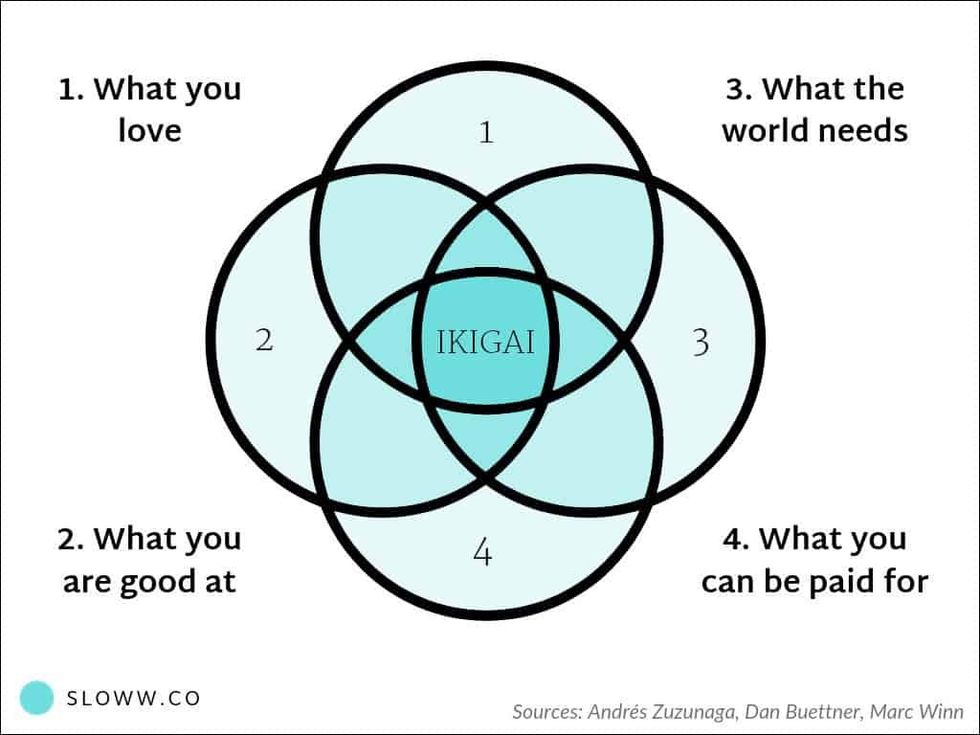
While the venn diagram is incredibly useful, there’s one major downside — the true meaning of ikigai isn’t about making money. The diagram might be valuable in understanding how you can launch a career of meaning, but in many ways, it’s the result of ikigai running through the money-oriented worldview of the West.
In fact, a 2010 study of 2,000 people in Japan found that only a third saw work as their ikigai. In addition, the Japanese translation of life means both your lifespan, and everyday life. This leads to another possible misinterpretation — ikigai can be discovered in the simple, day-to-day joys of living, not a grandiose plan or life mission worthy of Hollywood fame. It’s a spectrum of joy, from the seemingly mundane to the miraculous, and everything between.
The five pillars of ikigai
So if the ikigai isn’t discovered through a venn diagram, how do you apply the concept to your life? In The Little Book of Ikigai, Japanese neuroscientist and author Ken Mogi offers a five-pillar framework. By following this framework, you’re able to cultivate the type of lifestyle that allows for the emergence of ikigai:
Pillar One: Start Small
Discovering a new theme of existence begins with small steps. That could be as simple as making the inner commitment to start creating a life of enhanced purpose.
What changes could you make, today, to start that process? Is there a passion, or calling, that you sense on the periphery of your awareness? What could you do in order to start honoring that? Remember, purpose doesn’t have to be elaborate or grand.
Applying Kamiya’s work, you could journal and answer the two questions: what is my existence for? What is the purpose of my existence? Don’t think about it too much, just see what surfaces.
Additionally, consider what things in life are the source of ikigai, or when are the moments when you feel ikigai-kan. For me, writing is the source of both. Although now established as a writer, in the beginning, it started with a commitment to write a little every day.
Pillar Two: Releasing Yourself
This pillar demonstrates how deep the philosophy of ikigai is, and its entanglement with other Eastern philosophies that have stood the test of time, such as Buddhism.

Releasing yourself means to let go of all the things in life you hold onto, that cause some form of suffering.
It’s similar to the Buddhist practices of non-attachment. Are you attached to your self-image, what other people think of you, or always thinking about a time you’ll finally be happy?
Releasing yourself requires accepting where you’re at, who you are, and the moment in front of you. It leads to a state of peaceful surrender, going with the flow, rather than grappling with life.
Ikigai is, after all, a practice of aligning with nature. “The greatest secret of the ikigai, ultimately, has to be the acceptance of oneself, no matter what kind of unique features one might happen to be born with,” Mogi writes.
Pillar Three: Harmony and Sustainability
This step is connected to your environment. Ikigai incorporates the people in our lives, our immediate community, the quality and sustainability of all living things we interact with.
As Mogi says, “A man is like a forest; individual and yet connected and dependent on others for growth.” Harmony and sustainability are both inner and outer experiences, reflected in your emotions, your thoughts, the way you interact with the world, the way you go about your work.

Consider any area of life where there is disharmony. Perhaps you have a few relationships that cause friction, or you are pushing yourself to extremes, unable to sustain that approach to hustle culture for the long term. In what ways can you invite a more peaceful approach? How can you be the source of harmony, for yourself, and for the wider world around you?
That doesn’t have to mean being half-hearted in what you do, quite the opposite, as ikigai encourages commitment and passion in equal measure. But make sure not to fall into traps of seriousness, and keep an explorative, playful attitude to yourself, your relationships, your community, and your work.
Pillar Four: The Joy of Little Things
Ikigai is a comprehensive philosophy, as well as being an antidote to a lot of modern approaches to finding happiness through constant striving, or the craving for success or recognition.
Deeply embedded in the Japanese concept is finding joy in little things. Your morning coffee. A smile from a stranger. An unexpected spell of sunshine. A message from a friend you’ve not spoken to in a while. A delicious sip of energizing green tea. All of these are opportunities to enjoy small sparks of joy, sparks that pave the way for a life in honor of ikigai.

As Kamiya notes, those dedicated to ikigai spend all their days in fulfillment. Yes, there might be a challenging process of realizing your calling, and adjusting your life to make sure you have supreme focus on fulfilling your potential. But ikigai isn’t about the end destination, it’s about smelling the flowers on the way.
The easiest way to do this is to look for gratitude in your life. What things bring you a sense of comfort? What in your life would you have never predicted or thought you’d be able to achieve? What have you overcome? Who adds laughter or who supports you? All of these reflections of gratitude support the feeling of ikigai-kan.
Pillar Five: Being in the Here and Now
To reaffirm the intention of ikigai, and its link to mindfulness, the final pillar reminds us to be present. To pause. To become fully aware of what’s directly in front of us. To take things one step at a time, and notice when our minds get caught in the past, or jump ahead to the future. The more present you become, the richer life is, the more nourishing each moment, and the less fearful you become about uncertain futures.
The irony of trying to find happiness is that it keeps us always looking ahead, waiting for a moment to come. But as many Eastern philosophies have taught, that is an illusion. Only the present ever exists. And the more you’re able to truly arrive in the present moment, the more likely you will be to experience deeper fulfillment.
Ikigai is a philosophy that reminds us that, with a brief pause, a moment of gratitude for the small things, acceptance for who we are and where we’re at. Then you might end up finding purpose where you never expected it — right in front of you.
Right here, right now.
If you have any unanswered questions click here, and good luck on your journey!













